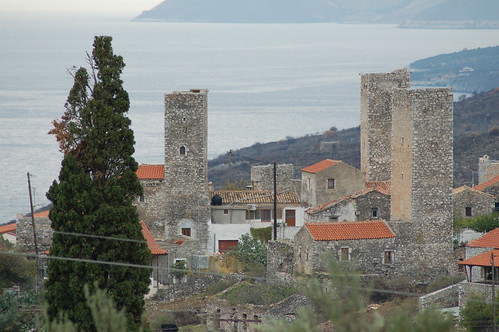Tuesday, August 14, 2007
Mani, Corfu, Rhodes, and all over.

"Mani Towers," by Flickr user cantaloupe99
Patrick Leigh Fermor, Mani (NYRB, 2006).
Mani is the most remote part of mainland Greece, the middle of three peninsulas jutting south from the Peloponnese, and when Fermor visited it in early 1950s, it was unconnected by road to the rest of the country and relatively untouched by modernity. Having fought on Crete with partisans during World War II, Fermor was well suited to travelling throughout Mani on foot and by small boat, and was in his element visiting remote villages. An autodidact, Fermor cannot turn around without seeing signs of the past. From the ancient Greece of myth to Byzantine painting to Frankish castles to the struggles with Ottoman rulers, Mani's history lives on in Fermor's eyes. Alone, either his sympathy for Mani's inhabitants and his engagement his its past would be remarkable, but the combined effect makes Fermor an unparalleled guide. Reading Mani leaves me wanting to visit Mani, but I'm not the autodidact that Fermor is.
Here is Fermor on the trail of a gorgon, and here he describes a particularly cultured Athenian cat.
Lawrence Durrell, Prospero's Cell (E.P. Dutton & Co., 1960).
Lawrence Durrell, Reflections On A Marine Venus (E.P. Dutton & Co., 1960).
In the middle of Mani, I found an old volume with two of Lawrence Durrell's travel books about Greece. Prospero's Cell is an impressionistic account of Durrell's time in Corfu before World War II, while Reflections On A Marine Venus describes the two years he spent on Rhodes after the war. These are pleasant books, but the curse for me is that I read them after reading Fermor. Durrell was less interested in the local history, particularly on Corfu, although he ran with a cultured crowd and relates their interests in such matters. Compared to most travel writers, he comes across as relatively engaged with ancient history, but not relative to Fermor. Likewise, there is a culture gulf between most of the islands' residents and Durrell, and his anecdotes about the peasants smack of a certain scorn. They add local color, but he does not seem to have much respect or use for them as people. But then, who can compare with Fermor? Read Durrell first, and he likely will impress.
Durrell describes the Corfiot taste for water here. This passage is from Durrell's account of the festival of St. Soulas. Fermor visited Durrell on Rhodes, and had this to say about it.
Ryszard Kapuscinski, Travels With Herodotus (Knopf, 2007).
Kapuscinski travelled the world as a Polish foreign correspondent, and he has written some terrific accounts of his travels. Of those that I've read, this is the least of them. Early in his career, Kapuscinski was given a copy of Herodotus's Histories, which he carried with him hither and yon. The Histories are wonderful, but too much of this work is a retelling of Herodotus, with fairly few stories from Kapuscinski's career, perhaps some odd anecdotes that didn't fit into other books. Here, for example, is his account of seeing Louis Armstrong play Khartoum. Good stuff. Good stuff, but not enough of it. Sadly, Kapuscinski died last January, a real loss. Happily, a little Googling suggests that he has several other works that haven't been translated into English, and maybe some of these were written when he was younger and still peripatic.